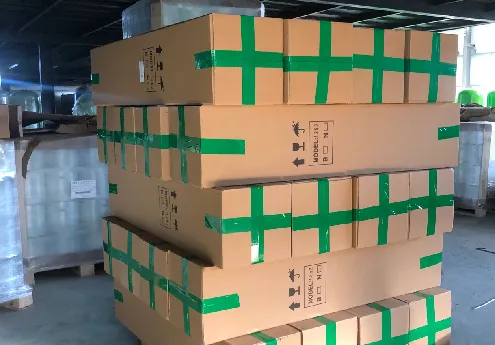loading...
- No. 9, Xingyuan South Street, Dongwaihuan Road, Zaoqiang County, Hengshui, Hebei, China
- admin@zjcomposites.com
- +86 15097380338
- Welcome to visit our website!
Exploring the Benefits of FRP Roof Decks for Modern Construction Projects
Exploring FRP Roof Decks A Comprehensive Overview
In the realm of modern construction, the pursuit of durable and efficient building materials has led to the rising popularity of fiberglass reinforced plastic (FRP) roof decks. Combining lightweight properties with exceptional strength, FRP roof decks present a revolutionary solution for a variety of roofing applications, especially in commercial and industrial settings. This article delves into the characteristics, advantages, applications, and maintenance associated with FRP roof decks, showcasing why they are becoming a preferred choice among builders and architects.
What is FRP?
Fiberglass reinforced plastic (FRP) is a composite material made of a polymer matrix reinforced with fiberglass. This combination yields a material that is not only lightweight but also incredibly strong and resistant to environmental factors. With a corrosion-resistant surface, FRP is an excellent choice for roof decking that must withstand the elements over time.
Characteristics of FRP Roof Decks
FRP roof decks are known for several key characteristics
1. Lightweight One of the most significant benefits of FRP is its low weight compared to traditional materials like metal and concrete. This feature reduces the load on structural supports, potentially lowering construction costs.
2. High Strength-to-Weight Ratio Despite being lightweight, FRP exhibits remarkable strength, making it capable of bearing heavy loads without compromising on safety.
3. Corrosion Resistance FRP is immune to many chemical attacks, which is particularly advantageous in industrial environments where harsh chemicals may be present. This property extends the lifespan of the roofing system significantly.
4. Thermal Insulation FRP provides natural thermal insulation which can help in energy conservation within the building, making it a viable option for both hot and cold climates.
5. Fire Resistance Many FRP formulations are designed to meet strict fire safety standards, an essential factor in commercial construction.
Advantages of Using FRP Roof Decks
frp roof deck

1. Cost-Effectiveness Although the initial investment may be higher than traditional materials, the long-term savings in maintenance and energy costs often offset the upfront expense. Additionally, the lightweight nature of FRP can lead to reduced labor costs during installation.
2. Design Flexibility FRP can be molded into various shapes and sizes, allowing architects and designers the creative freedom to tailor roofs to specific building styles and requirements.
3. Quick Installation The ease of handling and installing FRP roof decks contributes to faster project completion times. This efficiency is a significant advantage in tight construction schedules.
4. Low Maintenance The durability and resistance to fading and weathering require minimal upkeep over the years, making FRP an attractive option for building owners looking to minimize maintenance efforts.
Applications of FRP Roof Decks
FRP roof decks are versatile and can be used in numerous applications
- Industrial Facilities Their resistance to chemicals and ease of maintenance make FRP ideal for factories and warehouses. - Commercial Buildings Offices and retail spaces benefit from the aesthetic appeal and insulating properties of FRP roofing. - Recreational Structures Modern sports facilities and recreational centers often deploy FRP roofs for their durability and design flexibility.
Maintenance of FRP Roof Decks
While FRP roof decks require minimal maintenance, certain best practices can enhance their longevity. Regular inspections for any signs of wear, debris accumulation, or damage should be conducted. Cleaning with gentle soap and water, avoiding harsh chemicals that could erode the surface, will keep the roofing material in optimal condition. Additionally, ensuring proper drainage systems are in place can prevent water accumulation, further enhancing the roof's lifespan.
Conclusion
FRP roof decks represent a paradigm shift in roofing technology, offering a wealth of benefits that address the evolving needs of the construction industry. With their lightweight nature, strength, resistance to environmental factors, and ease of installation, FRP roof decks are becoming a go-to choice for architects and builders alike. As the focus on sustainable and efficient materials continues to grow, FRP is poised to play an increasingly vital role in future construction projects, leading to longer-lasting and more resilient buildings.
-
The Rise of FRP Profiles: Strong, Lightweight, and Built to LastNewsJul.14,2025
-
SMC Panel Tanks: A Modern Water Storage Solution for All EnvironmentsNewsJul.14,2025
-
GRP Grating: A Modern Solution for Safe and Durable Access SystemsNewsJul.14,2025
-
Galvanized Steel Water Tanks: Durable, Reliable, and Ready for UseNewsJul.14,2025
-
FRP Mini Mesh Grating: The Safer, Smarter Flooring SolutionNewsJul.14,2025
-
Exploring FRP Vessels: Durable Solutions for Modern Fluid HandlingNewsJul.14,2025
-
GRP Structures: The Future of Lightweight, High-Performance EngineeringNewsJun.20,2025
